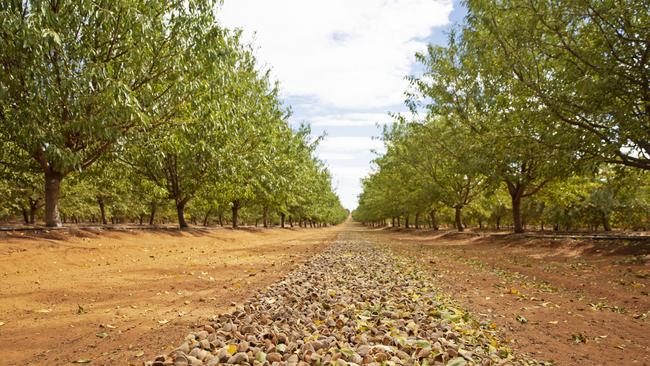Australian Almonds appoints celebrity chef to help capitalise on export boom
Australian almond growers are eyeing new overseas markets as exports boom and their board has appointed celebrity chef Poh as its first global ambassador.

Business
Don't miss out on the headlines from Business. Followed categories will be added to My News.
Australian almond growers are eyeing new export markets on the back of a boom in sales to China and India, as they look to capitalise on health-conscious consumption habits emerging in markets across Asia.
While about 80 per cent of the world’s almonds are grown in California, Australia has risen to become the world’s second-largest grower, producing about 130,000 tonnes annually from 22 million trees.
About 80 per cent of annual production is exported, with almonds now Australia’s most valuable horticultural export, bringing in close to $750m in annual export revenue. That number is expected to exceed $1.3bn by 2025.
While the industry sees an opportunity to gain more market share in the world’s two most populous countries – which account for half of all exports – it is also making a push into new markets where the health benefits of almonds are less understood.
Spearheading a new education and awareness campaign is celebrity chef Poh, who has been appointed the first global ambassador for Australian Almonds – the brand used by industry group the Almond Board of Australia to sell the story to the world.

Almond Board chief executive Tim Jackson said the marketing push followed a surge in exports supported by free trade agreements with China and India, and hefty tariffs imposed by Chinese authorities on US exporters during the Trump administration.
“California is still by far the biggest supplier of almonds in the world – and they’d gone in and developed a market in China for almonds, but then we were able to tap into this trade advantage,” he said. “Six years ago we had 300 tonnes of almonds going into China, whereas two seasons ago we had 50,000 tonnes, on the basis of this free trade agreement and the advantage we had over the Californians.
“India is our most traditional market overseas – we’ve been in there for more than 20 years, and it continues to grow.
“The demand from those two countries is huge.”
Mr Jackson said Indian tariffs on Australian almonds had been slashed by 50 per cent as a result of the FTA that came into force in December 2022, resulting in a more than doubling of annual exports to 25,000 tonnes.
The Almond Board is exploring opportunities in emerging markets where consumers are increasingly adopting health-conscious eating habits.
Australia has one of the world’s highest almond consumption rates, with average annual consumption of close to 1kg per person.
Rising demand for almonds, which have also ridden the wave of the alternative milk boom, has made the nuts one of Australia’s most valuable crops. And that has fuelled a plantings boom over the past decade, with orchard areas across the Sunraysia, Riverland and Riverina areas of the lower Murray more than doubling since 2016 from to more than 64,000ha.
Australia’s largest almond grower is Olam Food Ingredients, with about 12,000ha under production.
However, over the past couple of years subdued prices caused by an oversupply out of California and rising production costs have caused a crunch on margins described by Mr Jackson as “the toughest in living memory”.
Another challenge is looming on the horizon for the water-intensive industry, with the federal government recently launching the first major buyback program since changes were introduced last year to the Murray-Darling Basin Plan.
Mr Jackson said by reducing the pool of resources allocated to irrigation water prices within the major growing zones were likely to be pushed higher, putting more pressure on already high costs of production.
“We’ve got some uncertainty around the cost of water following the buyback, which really comes into effect next year,” he said. “Our biggest concern is just making sure that there is some sort of consideration around the socio-economic impacts of buybacks.
“They will help some people like grape growers who might be looking for an exit strategy … because they can’t make money on their vineyards. But for those still left in the industry that water will be lost to irrigation.
“If the water’s left the area that means you’ve either got to find something that can be grown with less water, or you’ve got less productivity on your land. And that’s our challenge in horticulture in the Murray Darling Basin, is continually trying to find ways of doing more with less.”
Malaysia-born Poh, who has hosted several cooking shows and published cook books since finishing runner-up in the first season of MasterChef Australia in 2009, said “a handful of almonds is my go-to snack when I’m feeling peckish”.
“I also have such fond memories of shelling homegrown almonds for the first time in the summer of ‘84 when we migrated to Australia, and I can’t wait to share everything I love about them as their new global ambassador,” she said.
More Coverage
Originally published as Australian Almonds appoints celebrity chef to help capitalise on export boom




